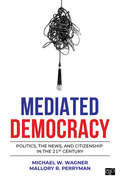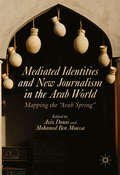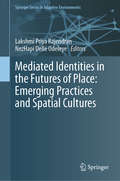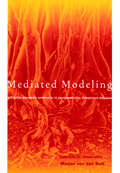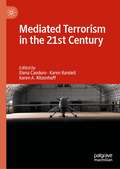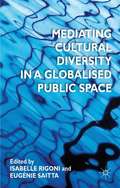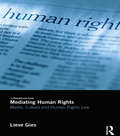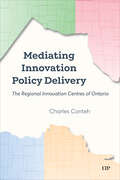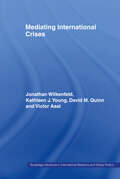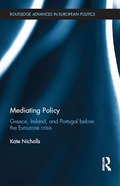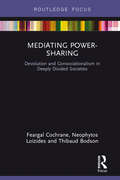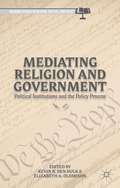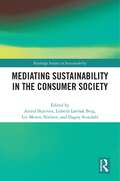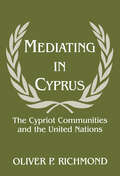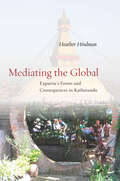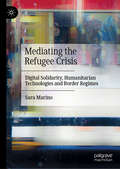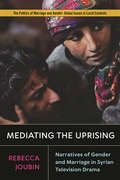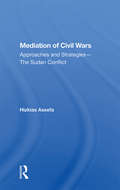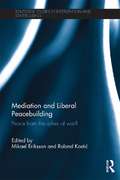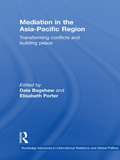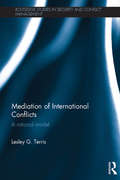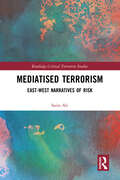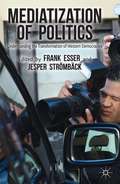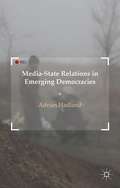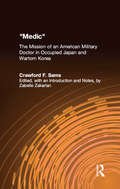- Table View
- List View
Mediated Democracy: Politics, the News, and Citizenship in the 21st Century
by Michael W. Wagner Mallory R. PerrymanMediated Democracy: Politics, the News, and Citizenship in the 21st Century takes a contemporary, communications-oriented perspective on the central questions pertaining to the health of democracies and relationships between citizens, journalists, and political elites. The approach marries clear syntheses of cutting-edge research with practical advice explaining why the insights of scholarship affects students’ lives. With active, engaging writing, the text will thoroughly explain why things are the way they are, how they got that way, and how students can use the insights of political communication research to do something about it as citizens.
Mediated Identities and New Journalism in the Arab World
by Aziz Douai Mohamed Ben MoussaThis book looks into the role played by mediated communication, particularly new and social media, in shaping various forms of struggles around power, identity and religion at a time when the Arab world is going through an unprecedented period of turmoil and upheaval. The book provides unique and multifocal perspectives on how new forms of communication remain at the centre of historical transformations in the region. The key focus of this book is not to ascertain the extent to which new communication technologies have generated the Arab spring or led to its aftermaths, but instead question how we can better understand many types of articulations between communication technologies, on the one hand, and forms of resistance, collective action, and modes of expression that have contributed to the recent uprisings and continue to shape the social and political upheavals in the region on the other. The book presents original perspectives and rigorous analysis by specialists and academics from around the world that will certainly enrich the debate around major issues raised by recent historical events.
Mediated Identities in the Futures of Place: Emerging Practices and Spatial Cultures (Springer Series in Adaptive Environments)
by Lakshmi Priya Rajendran NezHapi Dellé OdeleyeThis book examines the emerging problems and opportunities that are posed by media innovations, spatial typologies, and cultural trends in (re)shaping identities within the fast-changing milieus of the early 21st Century.Addressing a range of social and spatial scales and using a phenomenological frame of reference, the book draws on the works of Heidegger, Merleau-Ponty and Don Hide to bridge the seemingly disparate, yet related theoretical perspectives across a number of disciplines. Various perspectives are put forward from media, human geography, cultural studies, technologies, urban design and architecture etc. and looked at thematically from networked culture and digital interface (and other) perspectives.The book probes the ways in which new digital media trends affect how and what we communicate, and how they drive and reshape our everyday practices. This mediatization of space, with fast evolving communication platforms and applications of digital representations, offers challenges to our notions of space, identity and culture and the book explores the diverse yet connected levels of technology and people interaction.
Mediated Modeling: A System Dynamics Approach To Environmental Consensus Building
by Marjan van den Belt Thomas DietzMediated modeling is an innovative new approach that enhances the use of computer models as invaluable tools to guide policy and management decisions. Rather than having outside experts dispensing answers to local stakeholders, mediated modeling brings together diverse interests to raise the shared level of understanding and foster a broad and deep consensus. It provides a structured process based on system dynamics thinking in which community members, government officials, industry representatives, and other stakeholders can work together to produce a coherent, simple but elegant simulation model. Mediated Modeling by Marjan Van Den Belt is a practical guide to participatory modeling for both practitioners and students, one that is firmly theoretically grounded in the field of systems dynamics and environmental modeling. Five in-depth case studies describe the successful use of the technique in a variety of settings, and a final chapter synthesizes the lessons highlighted by the case studies.Mediated Modeling's step-by-step description of the techniques and practical advice regarding implementation offer a real-world solution for all those seeking to make sound decisions about the environment.
Mediated Terrorism in the 21st Century
by Karen Randell Karen A. Ritzenhoff Elena CaoduroMediated Terrorism in the 21st Century offers new interpretations of figures emerging from representations of terrorism and counterterrorism: the male hero, female agent, religious leader, victim/perpetrator, and survivor. This collection of essays by a broad array of international scholars reflects the altered image-making processes that have developed from George W. Bush’s “war on terror.” Building on current literature on media and terrorism, this volume analyzes the most recent technological developments that have impacted the way we experience terrorism: online videos, social media, cartoons, media feeds, and drones. The authors address different time periods, different terrorist groups, and explore the way filmmakers and television producers from the USA, Europe, South Africa, and the Middle East are documenting modern wars in popular culture.
Mediating Cultural Diversity in a Globalized Public Space
by Isabelle Rigoni Eugénie SaittaThrough enhancing reflection on the treatment of cultural diversity in contemporary Western societies, this collection aims to move the debate beyond the opposition between ethnicity and citizenship and demonstrate ways to achieve equality in multicultural and globalised societies.
Mediating Human Rights: Media, Culture and Human Rights Law
by Lieve GiesDrawing on social-legal, cultural and media theory, this book is one of the first to examine the media politics of human rights. It examines how the media construct the story of human rights, investigating what lies behind the apparent media hostility to human rights and what has become of the original ambition to establish a human rights culture. The human rights regime has been high on the political agenda ever since the Human Rights Act 1998 was enacted. Often maligned in sections of the press, the legislation has entered popular folklore as shorthand for an overbearing government, an overzealous judiciary and exploitative claimants. This book examines a range of significant factors in the mediation of human rights, including: Euroscepticism, the war on terror, the digital reordering of the media landscape, , press concerns about an emerging privacy law and civil liberties. Mediating Human Rights is a timely exploration of the relationship between law, politics and media. It will be of immense interest to those studying and researching across Law, Media Studies, Human Rights, and Politics.
Mediating Innovation Policy Delivery: The Regional Innovation Centres of Ontario
by Charles ContehReport cards and academic scholarship have been critical of innovation policy in Canada. But what if these reports have done a profound injustice to the story of knowledge-driven economic reinvention and the actual transformation taking place in the country? Spotlighting what is happening in cities and regions across Ontario, Mediating Innovation Policy Delivery argues that it is far more nuanced and exciting than what has been captured in scorecards and report cards. The book explores the intermediary institutions, the organizational brokers at the frontline of Canada’s innovation race, that are shepherding the process of economic reinvention in regions large and small. The book draws on case studies to explore three central themes. The first is about innovation, innovation policy, and their delivery systems. The second is that of regions as the frontlines of technological and socioeconomic change in the Canadian federation. The third covers the role of intermediary institutions as innovation platforms, highlighting their triumphs and tribulations as they strategically navigate through the shifting currents of change. The book’s main lessons apply not just to Ontario and Canada but also to other industrialized democracies worldwide. Ultimately, the book advances our knowledge of organizational instruments of innovation policy delivery that operate at the strategic interface between the state, market, and society.
Mediating International Crises (Routledge Advances in International Relations and Global Politics #34)
by Jonathan Wilkenfeld Kathleen Young David Quinn Victor AsalThis new book shows how international crises are dangerous episodes that can be destabilizing not only to the actors directly involved but also to the entire international system. Recognizing the primacy of crises as defining moments in international relations, scholars and policy makers alike are increasingly concerned with identifying mechanisms for crisis prevention, management and resolution. Mediating International Crises is the first comprehensive study into one such mechanism that has been used with increasing frequency in the 20th Century: mediation by a third party. This important research attempts to determine whether third party mediation is an effective means of alleviating or managing the turbulent and violent consequences of crises. The authors examine three approaches to mediation: facilitation communication between parties, formulating possible agreements and manipulating the parties through sanctions or rewards. They explore how these mediation approaches affect crisis outcomes through sanctions or rewards The book begins with a thorough discussion of the theoretical literature on mediation, with particular attention paid to the important distinction between crisis management and conflict resolution. The authors then provide empirical analyses of instances of mediation in 20th century international crises, which is supplemented with data derived from simulated negotiation settings with human subjects.
Mediating Policy: Greece, Ireland, and Portugal Before the Eurozone Crisis (Routledge Advances in European Politics)
by Kate NichollsAmongst the most serious consequences of the 2008 global financial collapse and sovereign debt crisis were a series of unprecedented international bailouts for Greece, Ireland, and Portugal between 2010 and 2011. This book analyses the development policies of Greece, Ireland, and Portugal between 1990 and 2008, before the Eurozone crisis. It identifies national-level differences between the policy strategies and outcomes that have characterized recent developments in the Greek, Irish, and Portuguese political economies. In addition, it provides an explanation for these differences that takes into account variations in political institutions and state-society relations. In doing so, it locates an explanation for policy divergence in the presence or absence of the policy-making institutions and processes that make up a 'zone of mediation'. Overall, it argues there is significant variation in the extent to which Ireland, Portugal and Greece have adapted their developmental goals and strategies in order to address the labour market challenges posed by the post-industrial era. This book will be of key interest to students and scholars of European politics and studies, comparative political economy, public policy/policy studies, and democracy studies.
Mediating Power-Sharing: Devolution and Consociationalism in Deeply Divided Societies
by Feargal Cochrane Neophytos Loizides Thibaud BodsonThis book focuses on the design and operation of power-sharing in deeply divided societies. Beyond this starting point, it seeks to examine the different ways in which consociational institutions emerge from negotiations and peace settlements across three counter-intuitive cases – post-Brexit referendum Northern Ireland, the Brussels Capital Region and Cyprus. Across each of the chapters, the analysis assesses how the design or mediation of these various forms of power-sharing demonstrate similarity, difference and complexity in how consociationalism has been conceived of and operated within each of these contexts. Finally, a key objective of the book is to explore and evaluate how ideas surrounding power-sharing have evolved and changed incrementally within each of the empirical contexts. The unifying argument within the book is that power-sharing has to have the capacity to adapt to changing political circumstances, and that this can be achieved through the interplay of formal and informal micro-level refinements to these institutions and the procedures that govern them, that allow such institutions to evolve over time in ways that increase their utility as conflict transformation governance structures for deeply divided societies. This book fills the gap in the published literature between theoretical and empirical studies of power-sharing, and will be of much interest to students of peace and conflict studies, consociationalism, European politics and IR in general.
Mediating Religion and Government
by Kevin R. Den Dulk Elizabeth A. OldmixonThe study of religion and politics is a strongly behavioral sub-discipline, and within the American context, scholars place tremendous emphasis on its influence on political attitudes and behaviors, resultuing in a better understanding of religion's ability to shape voting patterns, party affiliation, and views of public policy.
Mediating Sustainability in the Consumer Society (Routledge Studies in Sustainability)
by Dagny Stuedahl Astrid Skjerven Lisbeth Løvbak Berg Liv Merete NielsenThis book sheds light on the role and impact of sustainability mediation, an effective tool for political authorities and business enterprises to persuade consumers of the integrity of their actions, products, and services.In this era of ecological and societal crises fuelled by increasing consumption, sustainability has become a key buzzword and target to attain. Governments around the world argue that they will meet their sustainability goals through environmental actions, by enabling consumers to make better choices and expecting brands to respond accordingly. At the same time, consumers are overwhelmed by the messaging conveyed in sustainability marketing campaigns, often featuring misleading greenwashing, with political authorities, organisations, and business enterprises all having conflicting interests. In this complex scenario, mediation has become a crucial issue. This book offers a critical and multidisciplinary view of sustainability mediation from experts in the fields of philosophy, consumption research, media studies, fashion, design, and citizenship, offering a unique, holistic view. Each chapter highlights different and problematic aspects of the cultural narratives being communicated, for example, the necessity of growth and the notion of a green economy. They present current theories, methods, indicators, and strategies used to assess and measure the relation between mediation, behaviour, and sustainable development.This book is of interest to scholars, researchers, and postgraduate students in all subject fields concerned with sustainability, including design, visual communication, fashion, consumption, media and journalism, and sustainable development.
Mediating in Cyprus: The Cypriot Communities and the United Nations
by Oliver P. RichmondThe UN peacemaking operation in Cyprus has been one of the longest of its kind, but has resulted in discarded proposals, non-papers or reports. This study investigates the Cypriot parties' views of peacemaking, to shed light on the problem, and on the theoretical debates surrounding mediation.
Mediating the Global: Expatria's Forms and Consequences in Kathmandu
by Heather HindmanTransnational business people, international aid workers, and diplomats are all actors on the international stage working for organizations and groups often scrutinized by the public eye. But the very lives of these global middlemen and women are relatively unstudied. "Mediating the Global" takes up the challenge, uncovering the day-to-day experiences of elite foreign workers and their families living in Nepal, and the policies and practices that determine their daily lives. In this book, Heather Hindman calls for a consideration of the complex role that global middlemen and women play, not merely in implementing policies, but as objects of policy. Examining the lives of expatriate professionals working in Kathmandu, Nepal and the families that accompany them, Hindman unveils intimate stories of the everyday life of global mediators. "Mediating the Global" focuses on expatriate employees and families who are affiliated with international development bodies, multinational corporations, and the foreign service of various countries. The author investigates the life of expatriates while they visit recreational clubs and international schools and also examines how the practices of international human resources management, cross-cultural communication, and promotion of flexible careers are transforming the world of elite overseas workers.
Mediating the Refugee Crisis: Digital Solidarity, Humanitarian Technologies and Border Regimes
by Sara MarinoThis book looks at how Europe’s refugee crisis has provoked different political and humanitarian responses, all similarly driven by technology. The author first explores the transformation of Europe into an increasingly militarised space, where technologies are mainly used to exercise surveillance and to distinguish between citizens and unwanted migrants. She then shifts the attention to refugees’ practices of connectivity by looking at how technologies are used by refugees to communicate, perform and resist their exile. Finally, the book examines the opportunities and challenges that characterise the impact of digital social innovation in humanitarian settings. By focusing on how technologies are used to promote solidarity in crisis contexts, the volume provides an original contribution to studying the role of tech for good activism within the space of Fortress Europe. Based on interviews with refugees, digital humanitarians and social entrepreneurs, the book timely questions what Europe means today, and why dialogue is now more important than ever.
Mediating the Uprising: Narratives of Gender and Marriage in Syrian Television Drama (Politics of Marriage and Gender: Global Issues in Local Contexts)
by Rebecca JoubinMediating the Uprising: Narratives of Gender and Marriage in Syrian Television Drama shows how gender and marriage metaphors inform post-uprising Syrian drama for various forms of cultural and political critique. These narratives have become complicated since the uprising due to the Syrian regime’s effort to control the revolutionary discourse. As Syria’s uprising spawned more terrorist groups, some drama creators became nostalgic for pre-war days. While for some screenwriters a return to pre-2011 life would be welcome after so much bloodshed, others advocated profound cultural and social transformation, instead. They employed marriage and gender metaphors in the stories they wrote to engage in political critique, even at the risk of creating marketing difficulties for the shows or they created escapist stories such as transnational adaptations and Old Damascus tales. Serving as heritage preservation, Mediating the Uprising underscores that television drama creators in Syria have many ways of engaging in protest, with gender and marriage at the heart of the polemic.
Mediation Of Civil Wars: Approaches And Strategies--the Sudan Conflict
by Hizkias AssefaAs civil wars become forums for international conflicts and ideological rivalries, their containment and resolution is an increasingly important requisite for international peace. This book explores mediation as a means toward resolving such wars. Dr. Assefa argues that the sovereign sensitivities of incumbent governments, the risk of international
Mediation and Liberal Peacebuilding: Peace from the Ashes of War? (Routledge Studies in Intervention and Statebuilding)
by Mikael Eriksson Roland KostićThis book offers a state-of-the-art examination of peacemaking, looking at its theoretical assumptions, empirical applications and its consequences. Despite the wealth of research on external interventions and practices of Western peacebuilding, many scholars tend to rely on findings in the so-called 'post-agreement' phase of interventions. As a result, most mainstream peacebuilding literature pays limited or no attention to the linkages that exist between mediation practices in the negotiation phase and processes in the post-peace agreement phase of intervention. By linking the motives and practices of interveners during negotiation and implementation phases into a more integrated theoretical framework, this book makes a unique contribution to the on-going debate on the so-called Western ‘liberal’ models of peacebuilding. Drawing upon in-depth case-studies from various different regions of the world including Bosnia-Herzegovina, Kosovo, Afghanistan, Sudan, Ivory Coast, Senegal and Sierra Leone, this innovative volume examines a variety of political motives behind third party interventions, thus challenging the very founding concept of mediation literature. This book will of much interest to students of peacebuilding, statebuilding, peacemaking, war and conflict studies, security studies and IR in general.
Mediation in the Asia-Pacific Region: Transforming Conflicts and Building Peace (Routledge Advances in International Relations and Global Politics)
by Dale Bagshaw Elisabeth PorterThis book examines mediation in connection with peacebuilding in the Asia-Pacific region, providing practical examples which either highlight the weaknesses within certain mediation approaches or demonstrate best-practice. The authors explore the extent to which current ideas and practices of mediation in the Asia-Pacific region are dominated by Western understandings and critically challenge the appropriateness of such thinking. Featuring a range of case studies on Fiji, Vanuatu, Papua New Guinea, Malaysia, Vietnam, China, Singapore, Indonesia, the Philippines and Thailand, this book has three main aims: To challenge dominant Western practices and ways of thinking on mediation that currently are being imposed in the Asia-Pacific region; To develop culturally-fluent and socially just mediation alternatives that build upon local, traditional or religious approaches; To situate mediation within ideas and practices on peacebuilding. Making a unique contribution to peace and conflict studies literature by explicitly linking mediation and peacebuilding practices, this book is a vital text for students and scholars in these fields.
Mediation of International Conflicts: A Rational Model (Routledge Studies in Security and Conflict Management)
by Lesley G. TerrisThis book examines the use of third-party mediation as a conflict resolution method. In an attempt to explain why some, but not all, conflicts are mediated, this work argues that diverse conflict structures are inherently different in their susceptibility to mediation attempts. By offering a systematic method for measuring the transformability of conflict structures, this book contributes to our understanding of the sufficient and necessary conditions for mediation. In addition, the study offers an analytical framework for the examination of mediation as a trilateral rational bargaining process. Although the general concept of mediation as a three-person game is not new, most studies focus on either the disputants' perspectives or the mediator's perspective. In contrast, this study integrates the perspectives of all three parties. The framework links the different stages involved in the whole process of mediation, from the onset of mediation, through the mediation strategies used, to the outcome, rather than focusing on one particular aspect. The book applies the framework to two case studies – the conflict between Israel and Egypt and the conflict between India and Pakistan – and provides new insights into these conflicts from a mediation perspective. In general, the model developed here provides a framework for systematically assessing conflicts and the options available to those involved in the mediation process. This book will be of much interest to students of conflict resolution, mediation, war and conflict studies, Asian politics, Middle Eastern politics and IR in general.
Mediatised Terrorism: East-West Narratives of Risk (Routledge Critical Terrorism Studies)
by Saira AliThis book offers an East-West comparative analysis of mediatised terrorism. This is the first country-specific analysis of the mediatisation of terrorism, with Pakistan and Australia representing the two worlds, respectively. Caught up in the ‘9/11 effect’, Australia is known for its anti-terror ‘hyper-legislation’, despite the implausible nature of the threat. In contrast, Pakistan is plagued by terrorism, yet the military establishment favours a duplicitous policy of fighting militant groups selectively. To understand how the two diverse cultural sites, with their very different experiences of terrorism, make sense of this unpredictable threat, the book uses Beck’s World Risk Society theory as a conceptual framework to examine the production and construction of news narratives around the risk of terrorism in both countries through textual analysis of local news stories and in-depth interviews with Australian and Pakistani journalists. Narratives about ‘global terrorism’ are mostly ‘Western’, with fear of its impact on ‘Western’ democracy and civilisation. This book aims to fill the gap and present a nuanced understanding of global terrorism by examining the characteristics of the phenomenon in a Western as well as an Eastern location and the ways in which the risk of terrorism is being played out in the two worlds. This book will be of much interest to students of critical terrorism studies, media studies, Asia-Pacific politics, and International Relations.
Mediatization of Politics
by Jesper Str�mb�ck Frank EsserThe first book-long analysis of the 'mediatization of politics', this volume aims to understand the transformations of the relationship between media and politics in recent decades, and explores how growing media autonomy, journalistic framing, media populism and new media technologies affect democratic processes.
Media�State Relations in Emerging Democracies
by Adrian HadlandThe news media and the state are locked in a battle of wills in the world's emerging democratic states. It is a struggle that will determine whether or not democracy flourishes or withers in the 21st century. Using a number of case studies, including South Africa, this book evaluates what is at stake.
Medic: The Mission of an American Military Doctor in Occupied Japan and Wartorn Korea
by Crawford F. Sams Zabelle ZakarianIn the aftermath of the bombing of Hiroshima and Nagasaki, Crawford F. Sams led the most unprecedented and unsurpassed reforms in public health history, as chief of the Public Health and Welfare Section of the Supreme Commander of Allied Powers in East Asia. "Medic" is Sams's firsthand account of public health reforms in Japan during the occupation and their significance for the formation of a stable and democratic state in Asia after World War II. "Medic" also tells of the strenuous efforts to control disease among refugees and civilians during the Korean War, which had enormously high civilian casualties. Sams recounts the humanitarian, military, and ideological reasons for controlling disease during military operations in Korea, where he served, first, as a health and welfare adviser to the U.S. Military Command that occupied Korea south of the 38th parallel and, later, as the chief of Health and Welfare of the United Nations Command. In presenting a larger picture of the effects of disease on the course of military operations and in the aftermath of catastrophic bombings and depravation, Crawford Sams has left a written document that reveals the convictions and ideals that guided his generation of military leaders.
